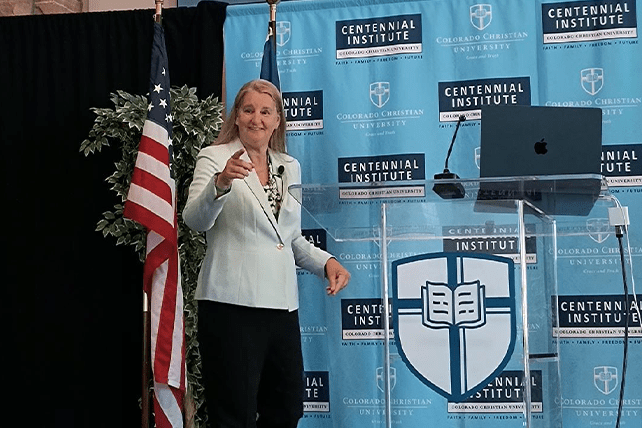Speakers at last weekend’s Centennial Impact Summit addressed the dangers of technology, including its “inhumane” effects on young users and on America as a whole.
The inaugural summit—held Sept. 26 and 27 at Colorado Christian University in Lakewood, Colorado—was titled “Theology, Technology, and Anthropology: Reclaiming Embodiment in a Brave New World.” Sessions explored what it means to be human and to bear God’s image in the tech-heavy 21st century.
Clare Morell, a fellow at the Ethics and Public Policy Center, made the case for a smartphone-free childhood. She encouraged families and communities to opt out of the cultural pressure to hand children screens. Jean Twenge, a psychology professor who specializes in generational differences, discussed technology’s impacts on young users, plus steps to minimize the harms.
Clare Morell: Abandon Tech To Serve God and Others
In her book “The Text Exit,” Clare Morell provides a blueprint for “freeing kids and teens from smartphones.” The policy analyst, who has worked in the White House Counsel’s Office and the Justice Department, cited high rates of self-harm, suicidal ideation, exposure to sexual content, and sextortion among U.S. youth.
Despite those real dangers, our culture makes it seem almost inevitable to give teens smartphones, Morell said. But that doesn’t have to be the case.
In calling for a screen-free childhood, she pushed back against the idea that parental limits and controls sufficiently protect kids. Neuroscience studies show that screens are similar to a “highly addictive drug,” Morell said, so no amount of exposure is safe. Phones and social media rewire and stunt kids’ brains, put them into hyper-emotional fight-or-flight mode, and desensitize them to real-world pleasures.
Morell also explored the “myth” of parental controls, saying restrictions on young tech users are meaningless. Because parental consent isn’t required to create a social media account or to download apps, she said, we’re throwing kids into “an adult world without adult supervision.”
In addition, apps rate themselves, so age suggestions are pointless. AI beauty apps that give users an attractiveness score, for example, are rated as appropriate for ages 4+. Kids are being exposed to adult content 24/7, Morell said, yet they’ve “never been less prepared to handle it,” due to technology’s effects on brain development.
Clare Morell: Feast on Real Life, Not on Tech
The mental health crises caused by smartphones and social media are symptoms of a deeper problem, according to author Clare Morell. Technology portrays and promotes an “inhumane way of life,” she said, rewarding self-focus and self-expression, not responsibility for others, deep thinking, or meaningful conversations.
“Christian parents want their children to love and serve Jesus,” said Morell, “but digital technology undermines that.” Tech also harms the nation, she argued, because America needs a virtuous citizenry of contributing members. So do churches, she said, noting that tech will affect the next generation of pastors and church leaders.
But Morell emphasized that it’s never too late for families to reverse course and for citizens to change the culture. A fast from technology, which she proposes in “The Tech Exit,” can recalibrate young brains and change adult habits.
As they detox from technology, people must “feast on real life,” Morell said. This involves forming counter-communities that reject pressure to use screens, adopting smartphone alternatives and workarounds, and replacing screens with relationships and responsibilities.
Morell praised new bell-to-bell bans on smartphones in schools, as well as efforts to actually verify ages—not just let kids self-attest that they are 13 (to create social media accounts) or 18 (to view porn).

